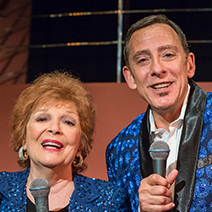Anita Gillette & Harold Sanditen
Harold and Broad
Metropolitan Room, NYC, October 23, 2016
Reviewed by Randolph B. Eigenbrode for Cabaret Scenes

Photo: Zoë White
In Anita Gillette and Harold Sanditen’s Harold and Broad, the pair gave the audience a walloping heap of “broad”—in all senses. From their entrance, spangled in matching blue sequin jackets (practically blinding), to their numerous medleys, this pairing seemed to perform an exercise in excess that was rarely exciting.
Perhaps it’s the duo’s dynamic differences. Gillette is a spitfire whose fearless style is a mix of energy and abandonment. Even when forgetting lyrics, patter or harmony lines, Gillette is hyper-present. Sanditen, much more reserved, seems hyper-aware of his work—mannered, choreographed and controlled. When combined, the audience gets a twosome who continually feel at odds with each other.
Director Barry Kleinbort valiantly structured a show in hopes of overcoming this. Mostly peppy tunes and medleys with choreographed looks (and requisite winks to boot), we get a myriad of song styles to keep the pacing at a fast clip. The arrangements dazzle—particularly Noal Galperin’s Latin foxtrot version of “I Could Have Danced All Night” (Alan Jay Lerner/Frederick Loewe) and Michael Roulston’s arpeggiated version of “Easy to Be Hard” (Galt MacDermot/James Rado/Gerome Ragni)—yet they mostly end up showcasing little except Gillette’s exuberance.
Sanditen had a standout moment with a pairing of “Johnny’s Song” (Kurt Weill/Paul Green) and “Imagine” (John Lennon). Here, his earnestness, even dripping with a pacifist sentiment, worked in his favor and was, indeed, one of the few vulnerable moments. Gillette sadly avoided ballads and instead served a sizzling mash-up of “Goody Goody” (Matty Malneck/Johnny Mercer) and “Gonna Get Along Without Ya Now” (Milton Kellem), allowing a playful tongue-in-cheek ditty dissolve into a chaotic burn.
There is charm to be found in these two, particularly Gillette. But when she quipped, “I don’t see any signs of stopping yet,” one only hopes that it will be in a show a bit less broad.





